E-Contracts, ADR & Intellectual Property Rights: Legal Framework
VerifiedAdded on 2023/01/11
|6
|1159
|40
Report
AI Summary
This report delves into the legal landscape of electronic contracts (e-contracts), alternative dispute resolution (ADR), and intellectual property rights (IPR). It examines the scope, nature, and legal enforceability of e-contracts, highlighting their growing popularity with the rise of online trade and digital shoppers. The report discusses ADR as a cost-effective and time-saving alternative to litigation, while also acknowledging its limitations and potential pitfalls, including the legal counsel required. Furthermore, the report emphasizes the importance of IPR for small business owners, covering patents, trademarks, and copyrights, and their role in protecting business assets and creating a brand image, as well as the advantages they provide when seeking loans and subsidies. The report also references the Winklevoss case to illustrate the finality of out-of-court settlements and the legal issues related to such settlements.
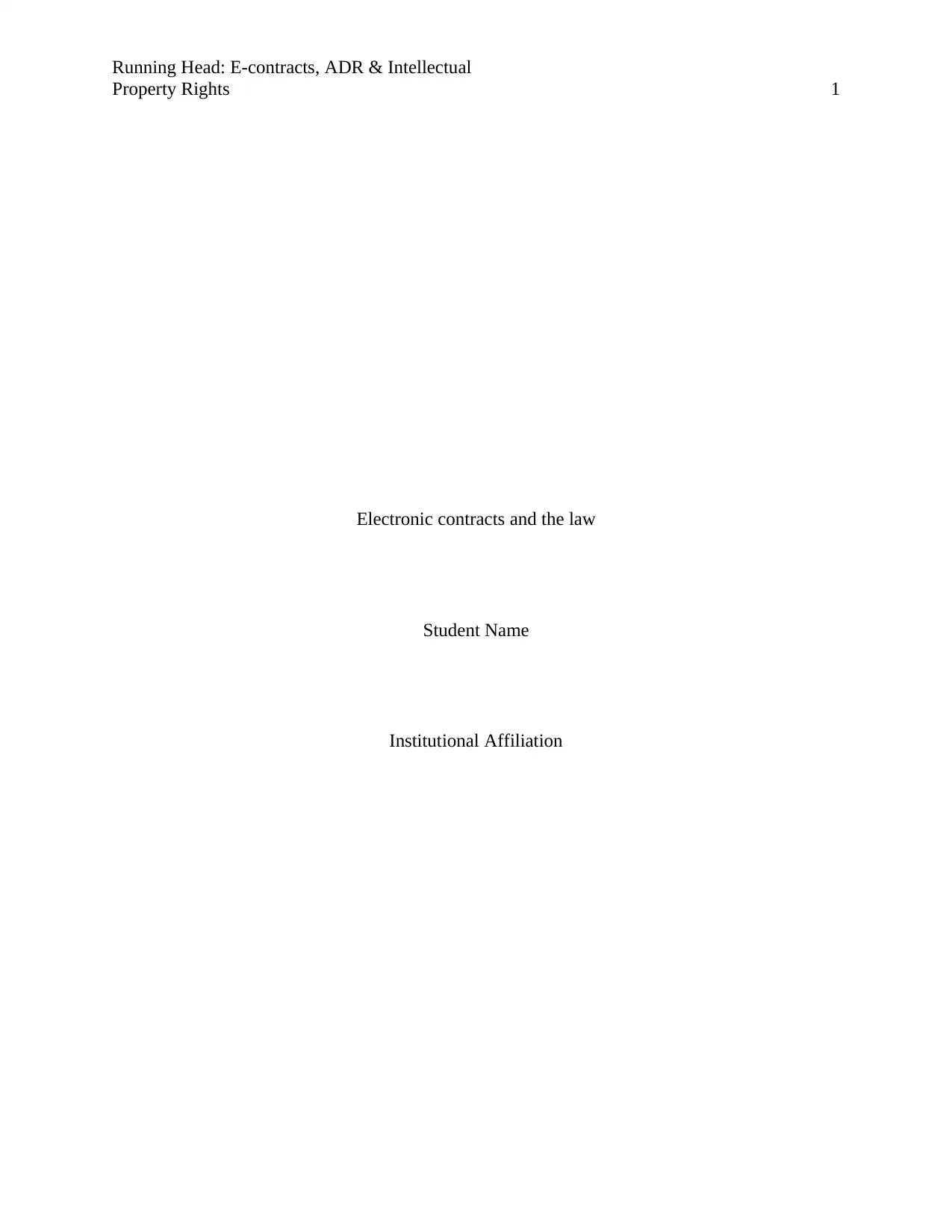
Running Head: E-contracts, ADR & Intellectual
Property Rights 1
Electronic contracts and the law
Student Name
Institutional Affiliation
Property Rights 1
Electronic contracts and the law
Student Name
Institutional Affiliation
Paraphrase This Document
Need a fresh take? Get an instant paraphrase of this document with our AI Paraphraser
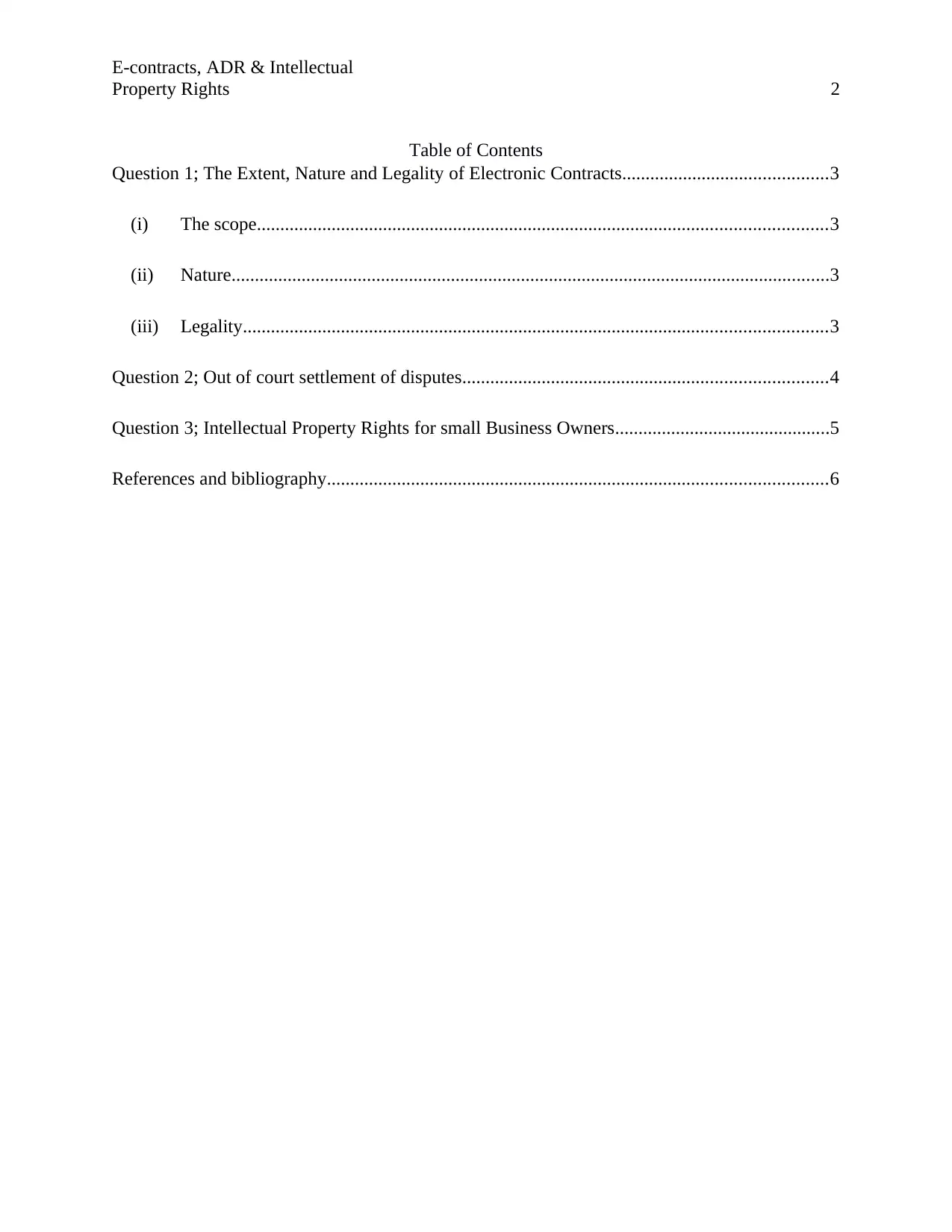
E-contracts, ADR & Intellectual
Property Rights 2
Table of Contents
Question 1; The Extent, Nature and Legality of Electronic Contracts............................................3
(i) The scope..........................................................................................................................3
(ii) Nature................................................................................................................................3
(iii) Legality.............................................................................................................................3
Question 2; Out of court settlement of disputes..............................................................................4
Question 3; Intellectual Property Rights for small Business Owners..............................................5
References and bibliography...........................................................................................................6
Property Rights 2
Table of Contents
Question 1; The Extent, Nature and Legality of Electronic Contracts............................................3
(i) The scope..........................................................................................................................3
(ii) Nature................................................................................................................................3
(iii) Legality.............................................................................................................................3
Question 2; Out of court settlement of disputes..............................................................................4
Question 3; Intellectual Property Rights for small Business Owners..............................................5
References and bibliography...........................................................................................................6
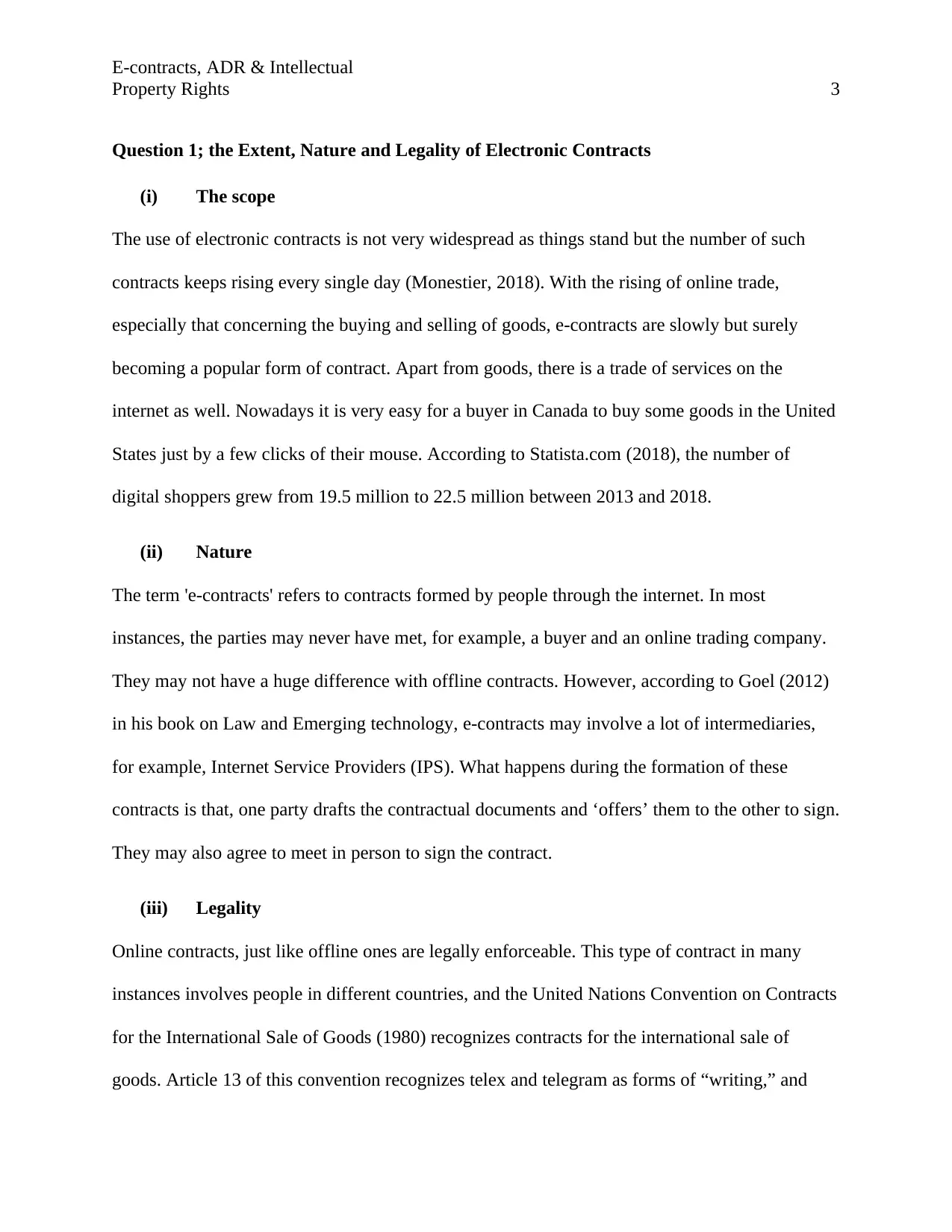
E-contracts, ADR & Intellectual
Property Rights 3
Question 1; the Extent, Nature and Legality of Electronic Contracts
(i) The scope
The use of electronic contracts is not very widespread as things stand but the number of such
contracts keeps rising every single day (Monestier, 2018). With the rising of online trade,
especially that concerning the buying and selling of goods, e-contracts are slowly but surely
becoming a popular form of contract. Apart from goods, there is a trade of services on the
internet as well. Nowadays it is very easy for a buyer in Canada to buy some goods in the United
States just by a few clicks of their mouse. According to Statista.com (2018), the number of
digital shoppers grew from 19.5 million to 22.5 million between 2013 and 2018.
(ii) Nature
The term 'e-contracts' refers to contracts formed by people through the internet. In most
instances, the parties may never have met, for example, a buyer and an online trading company.
They may not have a huge difference with offline contracts. However, according to Goel (2012)
in his book on Law and Emerging technology, e-contracts may involve a lot of intermediaries,
for example, Internet Service Providers (IPS). What happens during the formation of these
contracts is that, one party drafts the contractual documents and ‘offers’ them to the other to sign.
They may also agree to meet in person to sign the contract.
(iii) Legality
Online contracts, just like offline ones are legally enforceable. This type of contract in many
instances involves people in different countries, and the United Nations Convention on Contracts
for the International Sale of Goods (1980) recognizes contracts for the international sale of
goods. Article 13 of this convention recognizes telex and telegram as forms of “writing,” and
Property Rights 3
Question 1; the Extent, Nature and Legality of Electronic Contracts
(i) The scope
The use of electronic contracts is not very widespread as things stand but the number of such
contracts keeps rising every single day (Monestier, 2018). With the rising of online trade,
especially that concerning the buying and selling of goods, e-contracts are slowly but surely
becoming a popular form of contract. Apart from goods, there is a trade of services on the
internet as well. Nowadays it is very easy for a buyer in Canada to buy some goods in the United
States just by a few clicks of their mouse. According to Statista.com (2018), the number of
digital shoppers grew from 19.5 million to 22.5 million between 2013 and 2018.
(ii) Nature
The term 'e-contracts' refers to contracts formed by people through the internet. In most
instances, the parties may never have met, for example, a buyer and an online trading company.
They may not have a huge difference with offline contracts. However, according to Goel (2012)
in his book on Law and Emerging technology, e-contracts may involve a lot of intermediaries,
for example, Internet Service Providers (IPS). What happens during the formation of these
contracts is that, one party drafts the contractual documents and ‘offers’ them to the other to sign.
They may also agree to meet in person to sign the contract.
(iii) Legality
Online contracts, just like offline ones are legally enforceable. This type of contract in many
instances involves people in different countries, and the United Nations Convention on Contracts
for the International Sale of Goods (1980) recognizes contracts for the international sale of
goods. Article 13 of this convention recognizes telex and telegram as forms of “writing,” and
⊘ This is a preview!⊘
Do you want full access?
Subscribe today to unlock all pages.

Trusted by 1+ million students worldwide

E-contracts, ADR & Intellectual
Property Rights 4
many researchers deem this to mean that electronic contracts are written contracts and therefore
enforceable.
Question 2; Out of court settlement of disputes
Alternative Dispute Resolution (ADR) is something that many people have had to resort to. It is
advantageous for many reasons. First, it is a cheaper process than litigation (Delgado, 2017).
Court processes often take a lot of time as well, in some instances many years, and ADR serves
as a relief from this. The earlier a dispute is solved the cheaper the process for the parties
involved. Furthermore, the award of damages is unpredictable at trial, in addition to the process
being very stressful.
Indeed, there are legal issues that have not been covered by ADR. For instance, it may not work
for a process where an offended party wants an injunction. In situations where a party needs a
ruling on a point of law, ADR may not be capable of giving the required ruling. Alternative
dispute resolution is many a time involved in settling disputes involving money.
In the opinion of this study, it may be a good thing if a party receives the right legal counsel, and
where they want an urgent and considerably cheaper solution. It may be bad if a party goes into
it without getting good advice.
The courts are usually reluctant to reopen the settlements for a number of reasons. One of them is
the fact that parties in conflict usually seek legal advice in the process of ADR. The San Jose
District judge and the 9th Circuit were both reluctant to reopen the Facebook feud because the
Winklevosses were deemed to have received adequate legal counsel in the process. They were
themselves well versed with the law; given that they had studied at Harvard. Furthermore, the
reluctance by the court serves to give effect to the settlements.
Property Rights 4
many researchers deem this to mean that electronic contracts are written contracts and therefore
enforceable.
Question 2; Out of court settlement of disputes
Alternative Dispute Resolution (ADR) is something that many people have had to resort to. It is
advantageous for many reasons. First, it is a cheaper process than litigation (Delgado, 2017).
Court processes often take a lot of time as well, in some instances many years, and ADR serves
as a relief from this. The earlier a dispute is solved the cheaper the process for the parties
involved. Furthermore, the award of damages is unpredictable at trial, in addition to the process
being very stressful.
Indeed, there are legal issues that have not been covered by ADR. For instance, it may not work
for a process where an offended party wants an injunction. In situations where a party needs a
ruling on a point of law, ADR may not be capable of giving the required ruling. Alternative
dispute resolution is many a time involved in settling disputes involving money.
In the opinion of this study, it may be a good thing if a party receives the right legal counsel, and
where they want an urgent and considerably cheaper solution. It may be bad if a party goes into
it without getting good advice.
The courts are usually reluctant to reopen the settlements for a number of reasons. One of them is
the fact that parties in conflict usually seek legal advice in the process of ADR. The San Jose
District judge and the 9th Circuit were both reluctant to reopen the Facebook feud because the
Winklevosses were deemed to have received adequate legal counsel in the process. They were
themselves well versed with the law; given that they had studied at Harvard. Furthermore, the
reluctance by the court serves to give effect to the settlements.
Paraphrase This Document
Need a fresh take? Get an instant paraphrase of this document with our AI Paraphraser
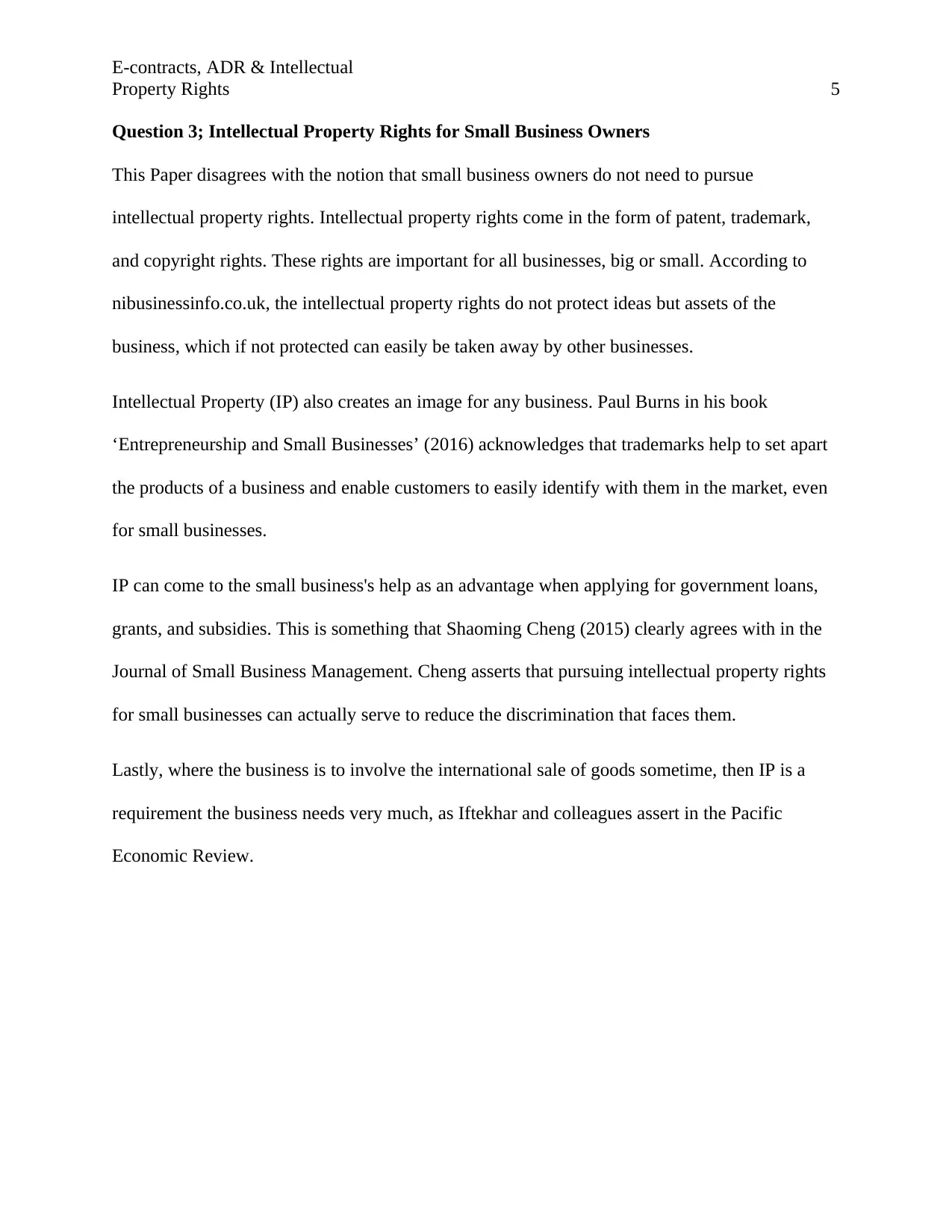
E-contracts, ADR & Intellectual
Property Rights 5
Question 3; Intellectual Property Rights for Small Business Owners
This Paper disagrees with the notion that small business owners do not need to pursue
intellectual property rights. Intellectual property rights come in the form of patent, trademark,
and copyright rights. These rights are important for all businesses, big or small. According to
nibusinessinfo.co.uk, the intellectual property rights do not protect ideas but assets of the
business, which if not protected can easily be taken away by other businesses.
Intellectual Property (IP) also creates an image for any business. Paul Burns in his book
‘Entrepreneurship and Small Businesses’ (2016) acknowledges that trademarks help to set apart
the products of a business and enable customers to easily identify with them in the market, even
for small businesses.
IP can come to the small business's help as an advantage when applying for government loans,
grants, and subsidies. This is something that Shaoming Cheng (2015) clearly agrees with in the
Journal of Small Business Management. Cheng asserts that pursuing intellectual property rights
for small businesses can actually serve to reduce the discrimination that faces them.
Lastly, where the business is to involve the international sale of goods sometime, then IP is a
requirement the business needs very much, as Iftekhar and colleagues assert in the Pacific
Economic Review.
Property Rights 5
Question 3; Intellectual Property Rights for Small Business Owners
This Paper disagrees with the notion that small business owners do not need to pursue
intellectual property rights. Intellectual property rights come in the form of patent, trademark,
and copyright rights. These rights are important for all businesses, big or small. According to
nibusinessinfo.co.uk, the intellectual property rights do not protect ideas but assets of the
business, which if not protected can easily be taken away by other businesses.
Intellectual Property (IP) also creates an image for any business. Paul Burns in his book
‘Entrepreneurship and Small Businesses’ (2016) acknowledges that trademarks help to set apart
the products of a business and enable customers to easily identify with them in the market, even
for small businesses.
IP can come to the small business's help as an advantage when applying for government loans,
grants, and subsidies. This is something that Shaoming Cheng (2015) clearly agrees with in the
Journal of Small Business Management. Cheng asserts that pursuing intellectual property rights
for small businesses can actually serve to reduce the discrimination that faces them.
Lastly, where the business is to involve the international sale of goods sometime, then IP is a
requirement the business needs very much, as Iftekhar and colleagues assert in the Pacific
Economic Review.
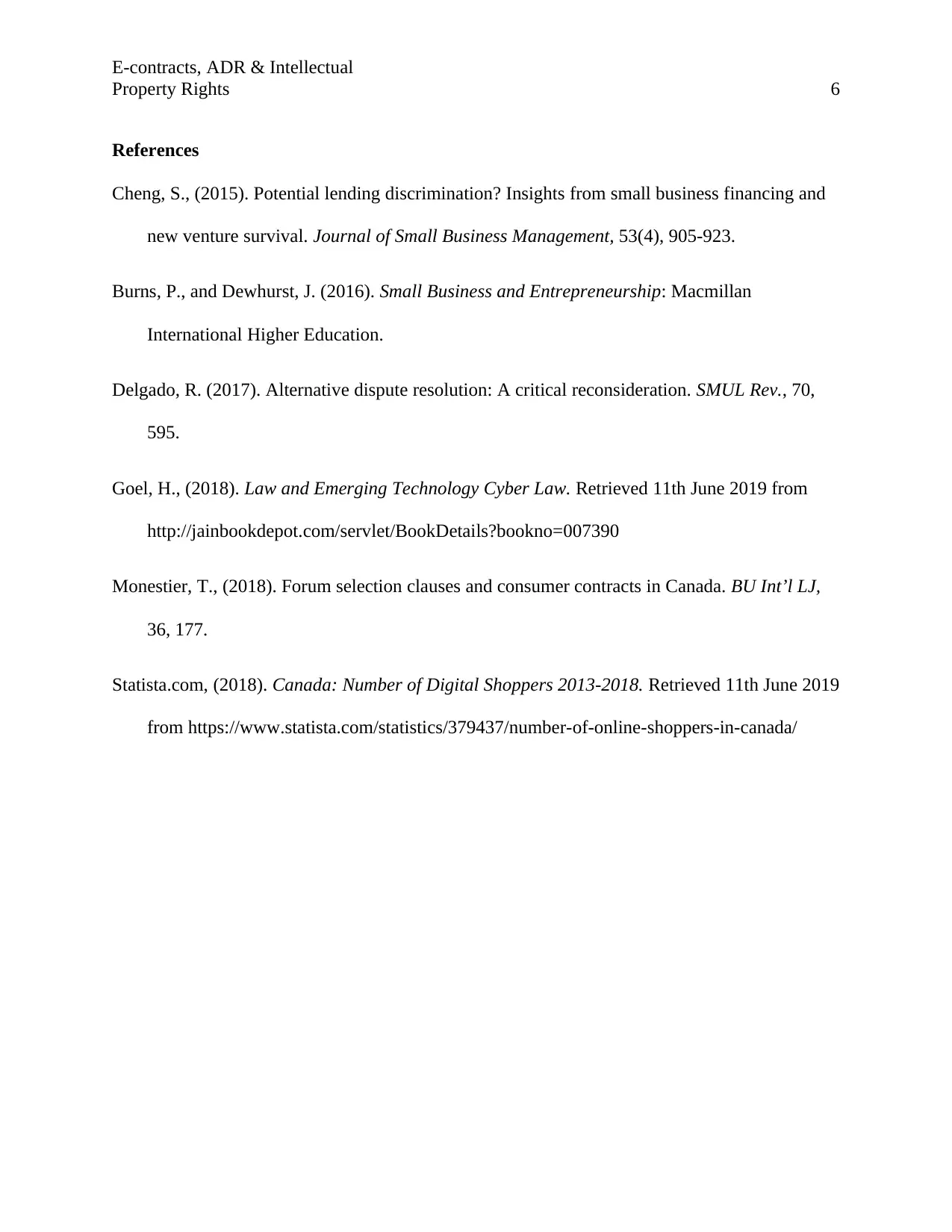
E-contracts, ADR & Intellectual
Property Rights 6
References
Cheng, S., (2015). Potential lending discrimination? Insights from small business financing and
new venture survival. Journal of Small Business Management, 53(4), 905-923.
Burns, P., and Dewhurst, J. (2016). Small Business and Entrepreneurship: Macmillan
International Higher Education.
Delgado, R. (2017). Alternative dispute resolution: A critical reconsideration. SMUL Rev., 70,
595.
Goel, H., (2018). Law and Emerging Technology Cyber Law. Retrieved 11th June 2019 from
http://jainbookdepot.com/servlet/BookDetails?bookno=007390
Monestier, T., (2018). Forum selection clauses and consumer contracts in Canada. BU Int’l LJ,
36, 177.
Statista.com, (2018). Canada: Number of Digital Shoppers 2013-2018. Retrieved 11th June 2019
from https://www.statista.com/statistics/379437/number-of-online-shoppers-in-canada/
Property Rights 6
References
Cheng, S., (2015). Potential lending discrimination? Insights from small business financing and
new venture survival. Journal of Small Business Management, 53(4), 905-923.
Burns, P., and Dewhurst, J. (2016). Small Business and Entrepreneurship: Macmillan
International Higher Education.
Delgado, R. (2017). Alternative dispute resolution: A critical reconsideration. SMUL Rev., 70,
595.
Goel, H., (2018). Law and Emerging Technology Cyber Law. Retrieved 11th June 2019 from
http://jainbookdepot.com/servlet/BookDetails?bookno=007390
Monestier, T., (2018). Forum selection clauses and consumer contracts in Canada. BU Int’l LJ,
36, 177.
Statista.com, (2018). Canada: Number of Digital Shoppers 2013-2018. Retrieved 11th June 2019
from https://www.statista.com/statistics/379437/number-of-online-shoppers-in-canada/
⊘ This is a preview!⊘
Do you want full access?
Subscribe today to unlock all pages.

Trusted by 1+ million students worldwide
1 out of 6
Related Documents
Your All-in-One AI-Powered Toolkit for Academic Success.
+13062052269
info@desklib.com
Available 24*7 on WhatsApp / Email
![[object Object]](/_next/static/media/star-bottom.7253800d.svg)
Unlock your academic potential
Copyright © 2020–2026 A2Z Services. All Rights Reserved. Developed and managed by ZUCOL.





